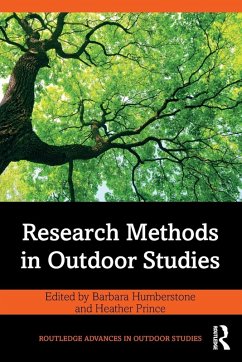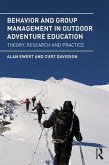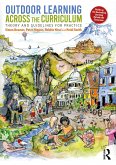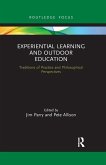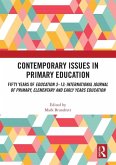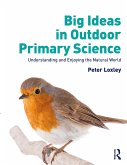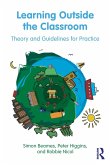Research Methods in Outdoor Studies
Herausgeber: Humberstone, Barbara; Prince, Heather
Research Methods in Outdoor Studies
Herausgeber: Humberstone, Barbara; Prince, Heather
- Broschiertes Buch
- Merkliste
- Auf die Merkliste
- Bewerten Bewerten
- Teilen
- Produkt teilen
- Produkterinnerung
- Produkterinnerung
Over the last two decades Outdoor Studies has emerged as an innovative and vibrant field of study. This is the first book to offer a comprehensive appraisal of established and cutting-edge research methods as applied to Outdoor Studies.
Andere Kunden interessierten sich auch für
![Behavior and Group Management in Outdoor Adventure Education Behavior and Group Management in Outdoor Adventure Education]() Alan Ewert (USA Indiana University)Behavior and Group Management in Outdoor Adventure Education67,99 €
Alan Ewert (USA Indiana University)Behavior and Group Management in Outdoor Adventure Education67,99 €![Outdoor Learning Across the Curriculum Outdoor Learning Across the Curriculum]() Simon Beames (Scotland University of Edinburgh)Outdoor Learning Across the Curriculum41,99 €
Simon Beames (Scotland University of Edinburgh)Outdoor Learning Across the Curriculum41,99 €![Experiential Learning and Outdoor Education Experiential Learning and Outdoor Education]() Experiential Learning and Outdoor Education34,99 €
Experiential Learning and Outdoor Education34,99 €![Contemporary Issues in Primary Education Contemporary Issues in Primary Education]() Contemporary Issues in Primary Education58,99 €
Contemporary Issues in Primary Education58,99 €![Big Ideas in Outdoor Primary Science Big Ideas in Outdoor Primary Science]() Peter LoxleyBig Ideas in Outdoor Primary Science52,99 €
Peter LoxleyBig Ideas in Outdoor Primary Science52,99 €![Reimagining the Role of Teachers in Nature-Based Learning Reimagining the Role of Teachers in Nature-Based Learning]() Rachel LarimoreReimagining the Role of Teachers in Nature-Based Learning25,99 €
Rachel LarimoreReimagining the Role of Teachers in Nature-Based Learning25,99 €![Learning Outside the Classroom Learning Outside the Classroom]() Simon BeamesLearning Outside the Classroom38,99 €
Simon BeamesLearning Outside the Classroom38,99 €-
-
-
Over the last two decades Outdoor Studies has emerged as an innovative and vibrant field of study. This is the first book to offer a comprehensive appraisal of established and cutting-edge research methods as applied to Outdoor Studies.
Hinweis: Dieser Artikel kann nur an eine deutsche Lieferadresse ausgeliefert werden.
Hinweis: Dieser Artikel kann nur an eine deutsche Lieferadresse ausgeliefert werden.
Produktdetails
- Produktdetails
- Routledge Advances in Outdoor Studies
- Verlag: Taylor & Francis Ltd
- Seitenzahl: 376
- Erscheinungstermin: 7. August 2019
- Englisch
- Abmessung: 234mm x 156mm x 20mm
- Gewicht: 590g
- ISBN-13: 9780367188832
- ISBN-10: 036718883X
- Artikelnr.: 57457510
- Herstellerkennzeichnung
- Libri GmbH
- Europaallee 1
- 36244 Bad Hersfeld
- gpsr@libri.de
- Routledge Advances in Outdoor Studies
- Verlag: Taylor & Francis Ltd
- Seitenzahl: 376
- Erscheinungstermin: 7. August 2019
- Englisch
- Abmessung: 234mm x 156mm x 20mm
- Gewicht: 590g
- ISBN-13: 9780367188832
- ISBN-10: 036718883X
- Artikelnr.: 57457510
- Herstellerkennzeichnung
- Libri GmbH
- Europaallee 1
- 36244 Bad Hersfeld
- gpsr@libri.de
Barbara Humberstone is Professor of Sociology of Sport and Outdoor Education at Buckinghamshire New University, UK, and Visiting Professor at Plymouth Marjon University, UK. She is also Editor-in-chief of the Journal of Adventure Education and Outdoor Learning. Her research interests include: Embodiment, alternative/ nature-based physical activities and life-long learning, wellbeing and outdoor pedagogies, and social and environmental justice. Heather Prince is Professor at the University of Cumbria, UK. She is interested in pedagogic practice in outdoor and environmental education, including the design of higher education courses and support for research programmes, students and staff. Her research interests are in school-based outdoor learning, sustainability and adventure. She is Associate Editor of the Journal of Adventure Education and Outdoor Learning and Principal Fellow of the Higher Education Academy, UK.
Introduction
Part I: Conceptualising and initiating the research process
1. Entangled philosophical and methodological dimensions of research in outdoor studies? Living with(in) messy theorisation
2. Ethical issues and practicalities in outdoor studies research
3. Designing effective research projects in outdoor studies
Part II: Qualitative methodologies - choosing an appropriate approach
4. Phenomenological approaches to research in outdoor studies
5. A critical examination of the place of interviews in outdoor studies research
6. Methods and techniques for capturing empirical material from experiences and stories in outdoor spaces and places
7. Mobilising research methods: Sensory approaches to outdoor and experiential learning research
8. Capturing complexity and collaborative emergence through case study design: An ecosocial framework for researching outdoor sustainability education practice
9. Ethnographic research in outdoor studies
10. Autoethnography: Creating stories that make a difference
11. Thinking the social through myself: Reflexivity in research practice
12. Finding my professional voice: Autobiography as a research method for outdoor studies
Part III: Contemporary creative qualitative methods
13. Creative nonfiction in outdoor studies
14. Shared-story approaches in outdoor studies: The HEAR (Hermeneutics
Auto/Ethnography and Action Research) 'listening' methodological model
15. Digital narrative methodology and multisensory outdoor ethnography
16. Practising feminist reflexivity: Collaborative letter writing as method
17. Post-qualitative inquiry in outdoor studies: A radical (non-)methodology
18. Together along the way: Applying mobilities through praxis in outdoor studies field research
19. Mobile methods in outdoor studies: Walking interviews with educators
20. Sensing the outdoors through research: Multisensory
multimedia
multimodal and multiliteracy possibilities
21. Representing experience: Creative methods and emergent analysis
Part IV: Quantitative and mixed methods
22. Deriving metrics and measures in outdoor research
23. Scientific investigations in outdoor environments
24. Mixed methods research in outdoor studies: Paradigmatic considerations
25. Mixed methods research in outdoor studies: Practical applications
26. Quantitative analyses of small samples with complex data-structures
Part V: Disseminating
communicating and sharing research
27. Publishing and disseminating outdoor studies research
28. Research hubs: The theory-practice nexus
29. Knocking on doors in the policy corridor - can research in outdoor studies contribute to policy change? A professional narrative on shaping educational policy and practice in Scotland
Part I: Conceptualising and initiating the research process
1. Entangled philosophical and methodological dimensions of research in outdoor studies? Living with(in) messy theorisation
2. Ethical issues and practicalities in outdoor studies research
3. Designing effective research projects in outdoor studies
Part II: Qualitative methodologies - choosing an appropriate approach
4. Phenomenological approaches to research in outdoor studies
5. A critical examination of the place of interviews in outdoor studies research
6. Methods and techniques for capturing empirical material from experiences and stories in outdoor spaces and places
7. Mobilising research methods: Sensory approaches to outdoor and experiential learning research
8. Capturing complexity and collaborative emergence through case study design: An ecosocial framework for researching outdoor sustainability education practice
9. Ethnographic research in outdoor studies
10. Autoethnography: Creating stories that make a difference
11. Thinking the social through myself: Reflexivity in research practice
12. Finding my professional voice: Autobiography as a research method for outdoor studies
Part III: Contemporary creative qualitative methods
13. Creative nonfiction in outdoor studies
14. Shared-story approaches in outdoor studies: The HEAR (Hermeneutics
Auto/Ethnography and Action Research) 'listening' methodological model
15. Digital narrative methodology and multisensory outdoor ethnography
16. Practising feminist reflexivity: Collaborative letter writing as method
17. Post-qualitative inquiry in outdoor studies: A radical (non-)methodology
18. Together along the way: Applying mobilities through praxis in outdoor studies field research
19. Mobile methods in outdoor studies: Walking interviews with educators
20. Sensing the outdoors through research: Multisensory
multimedia
multimodal and multiliteracy possibilities
21. Representing experience: Creative methods and emergent analysis
Part IV: Quantitative and mixed methods
22. Deriving metrics and measures in outdoor research
23. Scientific investigations in outdoor environments
24. Mixed methods research in outdoor studies: Paradigmatic considerations
25. Mixed methods research in outdoor studies: Practical applications
26. Quantitative analyses of small samples with complex data-structures
Part V: Disseminating
communicating and sharing research
27. Publishing and disseminating outdoor studies research
28. Research hubs: The theory-practice nexus
29. Knocking on doors in the policy corridor - can research in outdoor studies contribute to policy change? A professional narrative on shaping educational policy and practice in Scotland
Introduction
Part I: Conceptualising and initiating the research process
1. Entangled philosophical and methodological dimensions of research in outdoor studies? Living with(in) messy theorisation
2. Ethical issues and practicalities in outdoor studies research
3. Designing effective research projects in outdoor studies
Part II: Qualitative methodologies - choosing an appropriate approach
4. Phenomenological approaches to research in outdoor studies
5. A critical examination of the place of interviews in outdoor studies research
6. Methods and techniques for capturing empirical material from experiences and stories in outdoor spaces and places
7. Mobilising research methods: Sensory approaches to outdoor and experiential learning research
8. Capturing complexity and collaborative emergence through case study design: An ecosocial framework for researching outdoor sustainability education practice
9. Ethnographic research in outdoor studies
10. Autoethnography: Creating stories that make a difference
11. Thinking the social through myself: Reflexivity in research practice
12. Finding my professional voice: Autobiography as a research method for outdoor studies
Part III: Contemporary creative qualitative methods
13. Creative nonfiction in outdoor studies
14. Shared-story approaches in outdoor studies: The HEAR (Hermeneutics
Auto/Ethnography and Action Research) 'listening' methodological model
15. Digital narrative methodology and multisensory outdoor ethnography
16. Practising feminist reflexivity: Collaborative letter writing as method
17. Post-qualitative inquiry in outdoor studies: A radical (non-)methodology
18. Together along the way: Applying mobilities through praxis in outdoor studies field research
19. Mobile methods in outdoor studies: Walking interviews with educators
20. Sensing the outdoors through research: Multisensory
multimedia
multimodal and multiliteracy possibilities
21. Representing experience: Creative methods and emergent analysis
Part IV: Quantitative and mixed methods
22. Deriving metrics and measures in outdoor research
23. Scientific investigations in outdoor environments
24. Mixed methods research in outdoor studies: Paradigmatic considerations
25. Mixed methods research in outdoor studies: Practical applications
26. Quantitative analyses of small samples with complex data-structures
Part V: Disseminating
communicating and sharing research
27. Publishing and disseminating outdoor studies research
28. Research hubs: The theory-practice nexus
29. Knocking on doors in the policy corridor - can research in outdoor studies contribute to policy change? A professional narrative on shaping educational policy and practice in Scotland
Part I: Conceptualising and initiating the research process
1. Entangled philosophical and methodological dimensions of research in outdoor studies? Living with(in) messy theorisation
2. Ethical issues and practicalities in outdoor studies research
3. Designing effective research projects in outdoor studies
Part II: Qualitative methodologies - choosing an appropriate approach
4. Phenomenological approaches to research in outdoor studies
5. A critical examination of the place of interviews in outdoor studies research
6. Methods and techniques for capturing empirical material from experiences and stories in outdoor spaces and places
7. Mobilising research methods: Sensory approaches to outdoor and experiential learning research
8. Capturing complexity and collaborative emergence through case study design: An ecosocial framework for researching outdoor sustainability education practice
9. Ethnographic research in outdoor studies
10. Autoethnography: Creating stories that make a difference
11. Thinking the social through myself: Reflexivity in research practice
12. Finding my professional voice: Autobiography as a research method for outdoor studies
Part III: Contemporary creative qualitative methods
13. Creative nonfiction in outdoor studies
14. Shared-story approaches in outdoor studies: The HEAR (Hermeneutics
Auto/Ethnography and Action Research) 'listening' methodological model
15. Digital narrative methodology and multisensory outdoor ethnography
16. Practising feminist reflexivity: Collaborative letter writing as method
17. Post-qualitative inquiry in outdoor studies: A radical (non-)methodology
18. Together along the way: Applying mobilities through praxis in outdoor studies field research
19. Mobile methods in outdoor studies: Walking interviews with educators
20. Sensing the outdoors through research: Multisensory
multimedia
multimodal and multiliteracy possibilities
21. Representing experience: Creative methods and emergent analysis
Part IV: Quantitative and mixed methods
22. Deriving metrics and measures in outdoor research
23. Scientific investigations in outdoor environments
24. Mixed methods research in outdoor studies: Paradigmatic considerations
25. Mixed methods research in outdoor studies: Practical applications
26. Quantitative analyses of small samples with complex data-structures
Part V: Disseminating
communicating and sharing research
27. Publishing and disseminating outdoor studies research
28. Research hubs: The theory-practice nexus
29. Knocking on doors in the policy corridor - can research in outdoor studies contribute to policy change? A professional narrative on shaping educational policy and practice in Scotland

